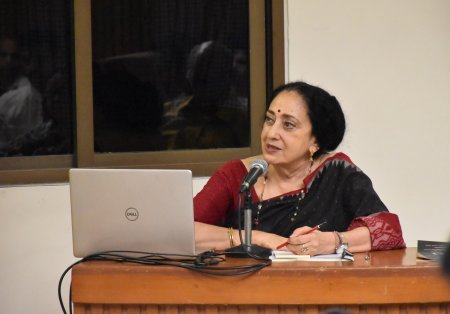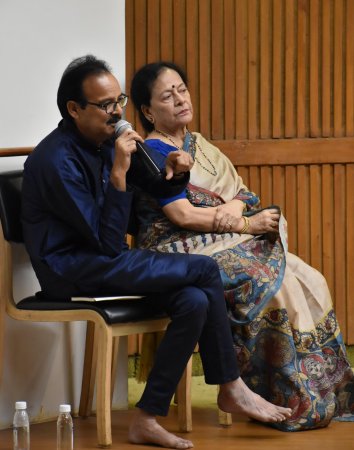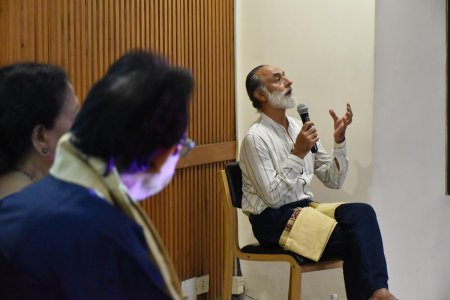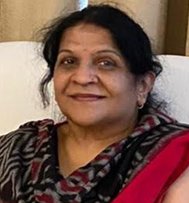
|   |

|   |
Omkara fest Parivartan-Change within and without - Ranee Kumar e-mail: ranee@journalist.com June 9, 2024 Sharon Lowen's Manasa-Art without Frontiers' Omkara festival was a wholesome treat: educational alongside artistic expression and experience. The morning seminar Parivartan-generational change in dance, was a cut above the rest. It was not the run-of-the-mill with paper presentations or PPTs. The most profound, pragmatic, principled thought processes flowed through the three-hour session enlightening the younger generation of artistes present there and the erudite guests as well. The speakers were drawn from different streams- Navtej Johar (Bharatanatyam maestro), Kumkum Mohanty (Odissi doyen) and Pt. Sunil Dubey (Trinetra Chhau Dance Company-Seraikella); hence diversity leading to unified approach, assessment and appreciation of art in its entirety. Sharon as moderator, steered the discussions in the most serene manner without outbursts and digressions.  Sharon Lowen Views flowed free and firm. From the junior-most disciples who perched on the ground in front of the dais to the veterans, we were all ears! Kumkum Mohanty, the senior-most among the awesome threesome, traced the historicity of Odissi through four decades and her own journey with her guru Kelucharan Mohapatra from the late 50s admitted to certain changes in Odissi and its presentation she had to incorporate in keeping with the times. However, she reiterated the need to work within the framework of classicality and tradition. She felt if tradition is compromised in the eagerness to play to the gallery, then the purity of purpose and objective of dance itself is simply lost. While there is a need to enthuse the young to understand in their own lingua and learn by taking recourse to modern concepts and tools, Mohanty opines that there is never a need to go overboard. "If a classical dancer/artiste cannot hold the audience for two hours then she/he is no dancer; it is not necessary to dilute the dance and present crap under the pretext of present-day audience wanting such art." Her message was loud and clear. Unlike earlier times, when one learnt these art forms and opted for flexible and less strenuous education like Humanities, the modern younger generation are taking up demanding technological and scientific studies as well as juggling with learning dance or music. Hence there is a need to adapt and adopt new methods and fringe changes to facilitate learning dance. Today's digital age teaching has to go hand-in-hand with tech terminology to explain mudras, hand gestures and foot placements. And certain old choreographies which used rather rustic props that no longer hold good can be replaced with more artistic ones that appeal to the audience. Similarly, she cited some of her Guru's choreographies and her own, the mild changes she introduced in them which uplifted rather than diluted the dance form. Thus far and no further! Her anecdotes of her 40 plus years with her guru Kelubabu was lapped up with immense interest by a spell-bound audience. There was so much to learn from her description of her talks and debates on dance with her guru which could actually be compiled into a book! Her demos sent us into peals of applause.  Sunil Dubey, Kumkum Mohanty Seraikella Chhau is exuberant in its newly recognised status as the ninth classical dance form of the country. Sunil Dubey expressed his sadness at losing his brother Gopal Prasad Dubey who founded the Trinetra Chhau Dance Centre in 1985 and since then struggled to keep it afloat under trying circumstances. It was heart-rending to learn that these artistes thrive and dance without giving up in desperation, only for the love of this martial art form that has been handed down to them as a legacy. And dance with its costumes, settings and other paraphernalia is an expensive art for anybody. Still, that these artistes practice and propagate their heritage with such devotion and dedication is something that should make this nation proud. Barring a few fellowships here and there, sponsorship for performances still evades these artistes and that is sad but reality. Sunil Dubey spoke at length about the early music and songs of this Chhau and the incorporation of classical raaga into the songs in course of time. Music and percussion are pivotal to a Chhau performance as amply demonstrated by a couple of members of Trinetra ensemble.  Navtej Johar Navtej Johar traced his odyssey through Kalakshetra which he terms as "heaven". An adept Bharatanatyam dancer he was honest enough to voice the fact that he found that 'even in heaven something was missing'. It was so understandable because all of us 'grow' with our art or art writing for that matter. We are constantly evolving and the fall-out is our search for soul nourishment. Johar started viewing the entire process of learning and performing the dance that is taught in institutions as a 'packaged art', which is very true. Initially this is fine where the body becomes a tool in expression of the art and dance becomes the medium and the emotion that is generated - the rasa, as we term it, is only a fleeting moment of joy that the finer skills of the artiste is able to emote and peter down to the onlookers but beyond that, it is not a life-long or life-sustaining experience. Though Johar didn't as much make a direct reference, this was one of the reasons he moved away or on to contemporary dance where his soul found fulfilment. He gave a brief into his background which in the first place led him to go in search of dance: his childhood / teenage exposure to the music of Begum Akhtar, Bullehshah and Punjabi Sufi. This revelation facilitated our appreciation of his quest and transition to a new artistic medium. The interactive seminar which wrapped up with Q&A raised a few focal issues which went well with the speakers and the participants.  Ranee Kumar is a journalist who brings in three decades of hard core journalistic experience with mainstream papers like the Indian Express and The Hindu to arts reporting. Her novel 'Song of Silence' and guest editing of attenDance widen her horizon. |